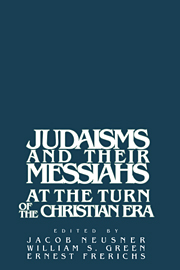Book contents
- Frontmatter
- Contents
- Preface
- List of Contributors
- 1 Introduction: Messiah in Judaism: Rethinking the Question
- 2 Wisdom Makes a Difference: Alternatives to “Messianic” Configurations
- 3 Salvation without and with a Messiah: Developing Beliefs in Writings Ascribed to Enoch
- 4 How the Authors of 1 and 2 Maccabees Treated the “Messianic” Promises
- 5 Messianism in the Maccabean Period
- 6 Waiting for the Messiah: The Spiritual Universe of the Qumran Covenanters
- 7 Philo and Messiah
- 8 Messiah and Gospel
- 9 Christology in Mark's Gospel
- 10 The Question of the Messiah in 4 Ezra
- 11 From Jewish Messianology to Christian Christology: Some Caveats and Perspectives
- 12 Mishnah and Messiah
- General Index
- Index to Biblical and Hermeneutical Texts
1 - Introduction: Messiah in Judaism: Rethinking the Question
Published online by Cambridge University Press: 08 January 2010
- Frontmatter
- Contents
- Preface
- List of Contributors
- 1 Introduction: Messiah in Judaism: Rethinking the Question
- 2 Wisdom Makes a Difference: Alternatives to “Messianic” Configurations
- 3 Salvation without and with a Messiah: Developing Beliefs in Writings Ascribed to Enoch
- 4 How the Authors of 1 and 2 Maccabees Treated the “Messianic” Promises
- 5 Messianism in the Maccabean Period
- 6 Waiting for the Messiah: The Spiritual Universe of the Qumran Covenanters
- 7 Philo and Messiah
- 8 Messiah and Gospel
- 9 Christology in Mark's Gospel
- 10 The Question of the Messiah in 4 Ezra
- 11 From Jewish Messianology to Christian Christology: Some Caveats and Perspectives
- 12 Mishnah and Messiah
- General Index
- Index to Biblical and Hermeneutical Texts
Summary
What is found at the historical beginning of things is not the inviolable identity of their origin; it is the dissension of other things. It is disparity.
Michel FoucaultProbably no religious category appears more endemic to Judaism than the messiah. That the messiah is a Jewish idea is a Western religious cliché. A broad academic and popular consensus holds that the messiah, a term conventionally taken to designate Israel's eschatological redeemer, is a fundamental Judaic conception and that conflicting opinions about the messiah's appearance, identity, activity, and implications caused the historical and religious division between Judaism and Christianity. It is standard practice to classify Jewish messianism as national, ethnic, political, and material, and to mark Christian messianism as universal, cosmopolitan, ethical, and spiritual. That Jewish anticipation of the messiah's arrival was unusually keen in first century Palestine and constituted the mise en scène for the emergence of Christianity is a virtual axiom of western history. The study of the figure of the messiah thus is inextricable from the quest for “Christian origins” and persists as a major scholarly strategy for discerning early Christianity's filiation and divergence from the Jewish religion of its day.
At the outset of his influential essay on the messianic idea in Judaism, Gershom Scholem observed: “Any discussion of the problems relating to Messianism is a delicate matter, for it is here that the essential conflict between Judaism and Christianity has developed and continues to exist.” Scholem's claim embodies three suppositions that have guided most research on the question and figure of the messiah. First, it assumes the constant centrality of the messiah in the morphology and history of Judaism and in the Jewish-Christian argument.
- Type
- Chapter
- Information
- Publisher: Cambridge University PressPrint publication year: 1988
- 1
- Cited by



